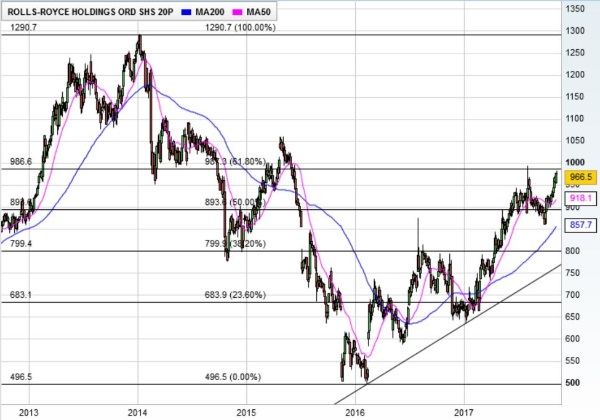Could Rolls-Royce shares really plunge 30%?
8th November 2017 13:37
has overcome plenty of problems of its recent past. Instead of profit warnings, the noise has been more positive and Rolls shares have surged by over 90% since the 2016 three-year low when they briefly fell below £5. However, the shares remain a "misunderstood asset", according to one expert who thinks they're worth almost a third less than the current market price.
"Valuation is largely based on management guidance – specifically ~£1 billion free cash flow (FCF) guidance around 2020, causing the shares to rerate to a level where multiples are more like on 2020 estimates than they are [aerospace & defence] peers," argue Barclays analysts Phil Buller and James Zaremba.
"We appreciate the market has to value the business somehow and FCF guidance is the only number provided when clean earnings are negative and current cash flows negligible. However, we believe 2020 is an abnormally high sweet spot for cash and do not support assigning it a 5% yield for valuation."
But what does all that mean? Well, an implied 2020 equity FCF yield of 5% certainly makes Rolls the most expensive name in the broker's coverage. It thinks this prices in the "most powerful compounding cash generation in the sector thereafter".

Despite high exposure to the attractive underlying civil aerospace cycle, Barclays expects "significant and enduring" cash and earnings headwinds over the next three years. Blame adverse mix and lower volumes in civil, plus accounting changes. There's also a risk to current estimates from new investment demands and "cash generation challenges".
Barclays' detailed research note stretches to 39 pages, but concludes that its 'underweight' rating for the shares is justified. And, while the price target is raised by 70p, the new objective of 670p still implies potential downside of over 30%.
If it's right, a move above £10 for the first time since 2015 is ruled out. It's a significant level from a technical perspective, too, being the 62% Fibonacci retracement of the decline from 2014 high to 2016 low.
That take on potential share price behaviour is reinforced by UBS.
It sees benefits of an early cycle recovery in its non-aerospace businesses, restructuring potential already showing through in results, plus "meaningful" cash improvement in civil aerospace from 2018 thanks to a strong increase in the installed fleet and cost reductions.
However, and despite, still rating Rolls a 'buy', an indicated fair value of 980p suggests limited upside from here.
This article is for information and discussion purposes only and does not form a recommendation to invest or otherwise. The value of an investment may fall. The investments referred to in this article may not be suitable for all investors, and if in doubt, an investor should seek advice from a qualified investment adviser.
Editor's Picks